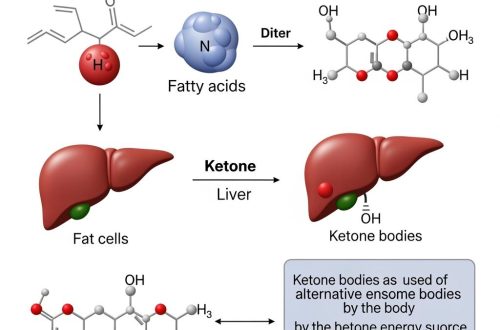A Comprehensive Guide
Inflammation is the body’s natural defense mechanism, but when it becomes chronic, it can lead to a host of serious health problems, including heart disease, diabetes, arthritis, and even cancer. In recent years, the ketogenic diet (keto) has gained attention not only as a weight-loss solution but also for its potential to reduce inflammation and improve chronic disease management.
In this blog post, we’ll explore how the keto diet influences inflammation, its role in managing chronic conditions, and the science-backed mechanisms behind its effects. Whether you’re considering keto for a health condition or simply aiming to reduce inflammation in your body, this guide will provide valuable insights.
What is Inflammation?
Inflammation is the body’s immune response to injury, infection, or harmful stimuli. It plays a key role in healing wounds and fighting off infections. However, when inflammation becomes chronic, it can persist for weeks, months, or even years, causing damage to tissues and organs.
Chronic inflammation has been linked to numerous diseases, including:
- Cardiovascular diseases like heart disease and stroke.
- Type 2 diabetes.
- Autoimmune disorders such as rheumatoid arthritis and lupus.
- Neurodegenerative diseases like Alzheimer’s and Parkinson’s.
- Obesity and metabolic syndrome.
Diet plays a significant role in modulating inflammation levels, with processed sugars, refined carbs, and unhealthy fats often contributing to inflammation. This is where the ketogenic diet comes in.
What is the Ketogenic Diet?
The ketogenic diet is a high-fat, low-carbohydrate, moderate-protein diet that shifts your body into a state of ketosis. In ketosis, the body burns fat for energy instead of carbohydrates, producing molecules called ketones.
Key Features of the Keto Diet:
- Low carbs (5-10% of daily calories): Limits inflammatory carbs like sugar and refined grains.
- High fats (70-80% of daily calories): Encourages anti-inflammatory fats from sources like avocados, nuts, seeds, and olive oil.
- Moderate protein (10-20% of daily calories): Prevents the body from converting excess protein into glucose.
This unique macronutrient ratio has profound effects on inflammation and chronic disease markers.
How Keto Reduces Inflammation
Several mechanisms explain why the ketogenic diet is effective at reducing inflammation:
1. Reduction in Blood Sugar and Insulin Levels
High blood sugar and insulin levels are known to trigger inflammation. The keto diet drastically reduces carbohydrate intake, which lowers blood sugar levels and reduces the need for insulin. This helps prevent inflammatory responses associated with insulin resistance and metabolic syndrome.
2. Ketones as Anti-Inflammatory Molecules
Ketones, particularly beta-hydroxybutyrate (BHB), have been shown to reduce inflammation by inhibiting a key inflammatory pathway called the NLRP3 inflammasome. This pathway is involved in chronic inflammation linked to conditions like type 2 diabetes, Alzheimer’s, and cardiovascular disease.
3. Reduction in Inflammatory Fatty Acids
The keto diet promotes the consumption of healthy fats (omega-3s from fish, nuts, and seeds) while reducing inflammatory fats (trans fats and omega-6s from processed foods). Omega-3 fatty acids are particularly effective at reducing inflammation and improving conditions like arthritis and heart disease.
4. Weight Loss and Reduced Adipose Tissue
Excess body fat, especially visceral fat, is a significant source of inflammation. The keto diet promotes weight loss, which can reduce the production of inflammatory markers like C-reactive protein (CRP) and interleukin-6 (IL-6).
5. Gut Health Improvements
The keto diet eliminates many inflammatory foods, such as sugar and refined carbs, while promoting healthy fats and proteins. This can improve gut health by reducing gut permeability (leaky gut) and inflammation associated with an imbalanced gut microbiome.
Keto and Chronic Diseases: What the Science Says
1. Keto and Heart Disease
Heart disease is often linked to chronic inflammation and risk factors like high blood sugar, insulin resistance, and obesity. The keto diet addresses these issues through:
- Lowering triglycerides and increasing HDL (good cholesterol).
- Reducing markers of inflammation like CRP.
- Improving blood sugar and insulin sensitivity.
A 2020 study published in the journal Nutrients found that a ketogenic diet reduced inflammatory markers and improved cardiovascular health in overweight individuals.
2. Keto and Type 2 Diabetes
Type 2 diabetes is characterized by insulin resistance and chronic inflammation. The keto diet’s ability to stabilize blood sugar and reduce insulin levels makes it a powerful tool for managing diabetes.
Research has shown that individuals on a ketogenic diet experience significant reductions in HbA1c (a marker of long-term blood sugar control) and inflammatory markers. In some cases, patients have even been able to reduce or eliminate their need for diabetes medications.
3. Keto and Neurodegenerative Diseases
Chronic inflammation in the brain is a major driver of neurodegenerative diseases like Alzheimer’s and Parkinson’s. The keto diet’s neuroprotective benefits stem from its ability to:
- Reduce oxidative stress and inflammation in the brain.
- Provide ketones as an alternative energy source for brain cells.
- Improve mitochondrial function.
A 2019 review in Frontiers in Neuroscience highlighted the potential of the ketogenic diet as a therapeutic strategy for Alzheimer’s disease, noting improvements in cognitive function and reductions in inflammation.
4. Keto and Autoimmune Disorders
Autoimmune diseases, such as rheumatoid arthritis and lupus, are driven by an overactive immune response and chronic inflammation. The keto diet can help by:
- Suppressing inflammatory pathways.
- Reducing the production of pro-inflammatory cytokines.
- Improving gut health, which is closely linked to immune function.
Studies have shown that individuals with autoimmune conditions who adopt a ketogenic diet often report reduced pain, improved mobility, and lower levels of inflammation.
5. Keto and Cancer
Chronic inflammation is a known risk factor for cancer. The keto diet may help reduce this risk by:
- Lowering blood sugar and insulin levels, which can starve cancer cells that rely on glucose for growth.
- Inhibiting inflammatory pathways that promote tumor growth.
- Enhancing the effectiveness of certain cancer treatments.
Although more research is needed, preliminary studies suggest that the keto diet can be a complementary therapy for some cancers.
Sample Keto Meal Plan for Reducing Inflammation
Here’s a sample anti-inflammatory keto meal plan:
Breakfast:
- Scrambled eggs cooked in olive oil with spinach and avocado.
- Black coffee or green tea.
Snack:
- Handful of walnuts or macadamia nuts.
Lunch:
- Grilled salmon with a side of mixed greens, cucumber, and olive oil dressing.
- A small serving of cauliflower rice.
Snack:
- Celery sticks with almond butter.
Dinner:
- Grass-fed beef burger (lettuce wrap) with sautéed broccoli and garlic.
- Keto-friendly chocolate mousse made with coconut cream and dark cocoa powder.
Drink Suggestions:
- Plenty of water.
- Herbal teas like turmeric or ginger to further reduce inflammation.
Tips for Success on Keto
- Focus on Whole Foods: Avoid processed keto products and prioritize nutrient-dense, anti-inflammatory foods like fatty fish, leafy greens, and healthy fats.
- Track Your Macros: Use apps like MyFitnessPal or Carb Manager to ensure you’re staying within your carb, fat, and protein targets.
- Stay Hydrated: Drink plenty of water to support digestion and reduce inflammation.
- Supplement Wisely: Consider omega-3 supplements or electrolytes to support your keto journey.
- Monitor Your Progress: Keep track of how you feel, including energy levels, inflammation symptoms, and weight loss.
Are There Risks to Consider?
While the keto diet has many benefits, it may not be suitable for everyone. Potential risks include:
- Keto flu during the initial transition phase.
- Difficulty maintaining the diet long-term.
- Possible nutrient deficiencies if not planned properly.
Always consult with a healthcare professional before starting the keto diet, especially if you have a chronic condition.
Conclusion
The ketogenic diet offers promising benefits for reducing inflammation and managing chronic diseases. By stabilizing blood sugar, promoting weight loss, and reducing inflammatory markers, keto can improve conditions like type 2 diabetes, heart disease, neurodegenerative disorders, and autoimmune diseases.
If you’re considering keto as a way to manage inflammation or improve your health, start with a well-structured plan and focus on whole, anti-inflammatory foods. With consistency and proper guidance, the keto diet could be a game-changer for your health.
FAQs
1. How long does it take to see inflammation benefits on keto?
Most people notice improvements in inflammation markers within a few weeks to a month of starting the keto diet.
2. Can keto worsen inflammation?
If you consume inflammatory fats (like trans fats) or processed keto foods, it could counteract the benefits of the diet. Stick to whole, healthy fats for the best results.
3. Is keto safe for everyone?
The keto diet may not be suitable for individuals with certain medical conditions, such as gallbladder issues or advanced kidney disease. Always consult a doctor before starting.






